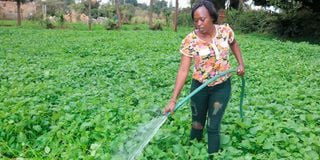Yes, money grows on managu

Ceciliah Maina irrigates her managu crops on her farm in Kikuyu, Kiambu County.
Ceciliah Maina walks on her black nightshade (managu) farm in Kikuyu, Kiambu County, looking at the progress of her crop.
She checks the crops’ leaves and smiles broadly after noticing they are pest-free.
Deep down her heart, she knows that it is just a matter of days before the crops hit the market.
“They are eight weeks old since I planted them; they should be harvested any time,” says Cecilia, 28, adding that she finds the vegetable lucrative because of its huge market in urban areas like Nairobi.
Ceciliah farms on three quarters of an acre, a quarter that hosts the mature crop.
She leased the farm at Sh10,000 a year, and has segmented it into smaller portions to ensure she supplies the produce to the market all the year round.
“I started the venture three years ago after unsuccessfully trying to grow cabbages and tomatoes. I grew the former on three-quarter acres and was lucky to recoup my investment due to pest attack,” she recounts, noting she was not lucky with tomatoes.
Ready market
A visit to a farm run by a church member in Kiambu turned an eye-opener for her. “As we were weeding his managu, I asked him why he settled on the vegetables and he elaborated on how the crop is easy to farm, is less attacked by pests and has a ready market.”
Ceciliah, who holds a diploma in cooperative management, followed the path.
From her first crop that occupied about eighth acre, she harvested crops that earned her Sh28,000.
“This was not bad investment considering that my seed capital was Sh16,500 from my own savings.”
She did managu and cowpeas in the second season but the crops were affected by floods and blight.
But she was back on track and as many other farmers growing traditional vegetables, the onset of Covid-19 gave her the boost she needed.

Ceciliah Maina harvests managu on her farm, in Kikuyu, Kiambu County.
“The crops were in huge demand during the period because of their nutritional value. Managu, for instance, is rich in antioxidants, vitamins, calcium, phosphorus, iron and calories.”
Grow new scions
Ceciliah sells the crop mostly to wholesale buyers from Dagoretti, Kawangware and Kangemi markets.
“The traders flock my farm and pay for the produce before I harvest. I don’t sell them in kilos but in portions grown on the land. This season, for instance, I estimate that I have spent Sh5,000 on each portion to grow the vegetables. I will sell at between Sh15,000 and Sh20,000 per harvest depending on how the vegetable has performed,” she says.
If she was to sell per kilo, on the other hand, each would go from Sh30-Sh50 and she would have to take the produce to the market herself.
The first harvest is done by cutting the stem with its leaves, allowing the rootstock to grow new scions.
“The crop yields for up to five months before it is uprooted and new one grown.”
She rotates the crop with others like slender leaf (mito) and jute mallow (mrenda) as well as dania.
To grow managu, she tills the land then mixes the soil with livestock manure to end up with a fine product. She further adds Di-Ammonium Phosphate (DAP) fertiliser before planting the crops by broadcasting and covering lightly with soil. “I grow the giant night shade variety which I source seeds from Busia. This is what buyers and consumers love.”
On quarter acre, she uses one-and-half kilos of seeds, which cost her Sh1,700.
Harvesting
According to Cecilia, who works as an office administrator in Nairobi, she waters the farm depending on stages of the crop. “In the initial stages, I apply water three times per week, which I source from a nearby well,” she states.
Besides irrigation, she ensures the crop is well weeded, sprayed and curbs pests like aphids, thrips and white flies.
Besides blight, other disease she grapples with are rust, nematodes, fusarium and bacterial wilt, powdery and downy mildew, and leaf spots.
The farmer employs three workers, especially during weeding and harvesting.
Richard Omondi from Agri-Irrigation and Solutions Africa, says using broadcasting method to plant managu seeds saves time and covers big space resulting in bumper harvest. However, when the crops mature and congest on the farm, it becomes difficult to control weeds.





